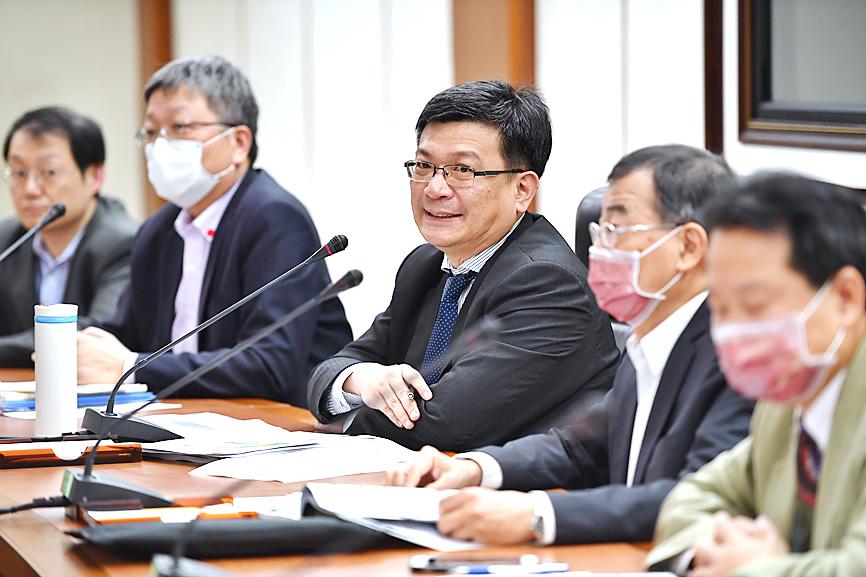Electricity rates are to remain unchanged at an average of NT$2.6253 per kilowatt-hour over the next six months, the Ministry of Economic Affairs said on Friday.
The decision came after a meeting of its electricity price review committee on Friday, which considered maintaining stability of electricity prices amid the COVID-19 pandemic.
The committee has not adjusted electricity rates since September 2018, making this the longest price freeze on record in Taiwan, ministry data showed.

Photo: CNA
While Taiwan Power Co (Taipower, 台電) suggested a slight rate increase of 0.07 percent, the committee decided to keep prices unchanged for the second and third quarters, the ministry said.
“Fuel costs are the main factor affecting electricity rates,” it said in a statement. “Recently, not only have international crude oil prices gradually rebounded, but coal prices have also risen.”
“However, it is still necessary to continue to monitor the containment of COVID-19 globally and the recovery of overall demand before determining whether the increase in fuel prices is a long-term trend,” it added.
The ministry said that the committee had pointed out that an adjustment to the nation’s energy structure would increase the cost of generating electricity, while electricity rates that adequately reflect the adjustment would help promote energy-saving policies.
The committee decided not to adjust the rates because, while the rate hike proposed by Taipower was not large, the administrative work required to enforce the increase could cost more than the 0.07 percent adjustment, Deputy Minister of Economic Affairs Tseng Wen-sheng (曾文生) told a news conference.
The committee would consider the effects of an adjustment to the nation’s power-generation structure on electricity rates at its next review meeting in September, when it would set the rates for the last quarter of this year and the first quarter of next year, Tseng said.
There is also no need to raise rates, as Taipower posted its first profit in five years in the first quarter, he said.
Taipower posted a profit of NT$8 billion (US$279.7 million) in the January-to-March period, thanks to lower power-generation costs, Tseng said, adding that the state-run company reported NT$26.1 billion in profit for the whole of last year.
Separately, the problem of a container vessel blocking the Suez Canal would not disrupt the nation’s liquefied natural gas (LNG) imports, the Bureau of Energy said on Friday.
The bureau said that Taiwan has signed long-term LNG contracts with several countries, including Australia, Papua New Guinea, Russia, Qatar and the US.
As LNG ships from those countries do not pass through the Suez Canal on their way to Taiwan, the incident would not affect the nation’s LNG imports, the bureau said.
“Last year, the nation’s LNG imports came from 13 countries, and the shipping routes from the sources differed,” the bureau said. “In the event of an emergency where imports are blocked, Taiwan can consult other long-term gas sources to procure and dispatch LNG.”

MULTIFACETED: A task force has analyzed possible scenarios and created responses to assist domestic industries in dealing with US tariffs, the economics minister said The Executive Yuan is tomorrow to announce countermeasures to US President Donald Trump’s planned reciprocal tariffs, although the details of the plan would not be made public until Monday next week, Minister of Economic Affairs J.W. Kuo (郭智輝) said yesterday. The Cabinet established an economic and trade task force in November last year to deal with US trade and tariff related issues, Kuo told reporters outside the legislature in Taipei. The task force has been analyzing and evaluating all kinds of scenarios to identify suitable responses and determine how best to assist domestic industries in managing the effects of Trump’s tariffs, he

TIGHT-LIPPED: UMC said it had no merger plans at the moment, after Nikkei Asia reported that the firm and GlobalFoundries were considering restarting merger talks United Microelectronics Corp (UMC, 聯電), the world’s No. 4 contract chipmaker, yesterday launched a new US$5 billion 12-inch chip factory in Singapore as part of its latest effort to diversify its manufacturing footprint amid growing geopolitical risks. The new factory, adjacent to UMC’s existing Singapore fab in the Pasir Res Wafer Fab Park, is scheduled to enter volume production next year, utilizing mature 22-nanometer and 28-nanometer process technologies, UMC said in a statement. The company plans to invest US$5 billion during the first phase of the new fab, which would have an installed capacity of 30,000 12-inch wafers per month, it said. The

Taiwan’s official purchasing managers’ index (PMI) last month rose 0.2 percentage points to 54.2, in a second consecutive month of expansion, thanks to front-loading demand intended to avoid potential US tariff hikes, the Chung-Hua Institution for Economic Research (CIER, 中華經濟研究院) said yesterday. While short-term demand appeared robust, uncertainties rose due to US President Donald Trump’s unpredictable trade policy, CIER president Lien Hsien-ming (連賢明) told a news conference in Taipei. Taiwan’s economy this year would be characterized by high-level fluctuations and the volatility would be wilder than most expect, Lien said Demand for electronics, particularly semiconductors, continues to benefit from US technology giants’ effort

‘SWASTICAR’: Tesla CEO Elon Musk’s close association with Donald Trump has prompted opponents to brand him a ‘Nazi’ and resulted in a dramatic drop in sales Demonstrators descended on Tesla Inc dealerships across the US, and in Europe and Canada on Saturday to protest company chief Elon Musk, who has amassed extraordinary power as a top adviser to US President Donald Trump. Waving signs with messages such as “Musk is stealing our money” and “Reclaim our country,” the protests largely took place peacefully following fiery episodes of vandalism on Tesla vehicles, dealerships and other facilities in recent weeks that US officials have denounced as terrorism. Hundreds rallied on Saturday outside the Tesla dealership in Manhattan. Some blasted Musk, the world’s richest man, while others demanded the shuttering of his